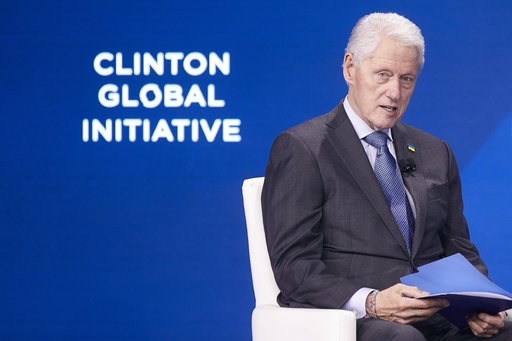
Former President Bill Clinton humorously recalled feeling a sense of disorientation when he transitioned back to civilian life in 2001 after serving two terms in office, noting that the familiar fanfare of “Hail to the Chief” was no longer played in his honor. However, he discovered that his ongoing philanthropic efforts allowed him to continue making a positive impact in the world, a theme emphasized in his recently released book, “Citizen: My Life After the White House,” which came out on Tuesday and is published by Knopf.
In a recent telephone interview, Clinton expressed his satisfaction with his post-presidency endeavors, stating, “I had a good time doing it.” He highlighted that many individuals are willing to support initiatives that may not seem immediately beneficial to them financially when presented with logical arguments for action. This approach has notably facilitated the establishment of a competitive market for generic HIV/AIDS medications, significantly reducing costs and making treatments accessible in various countries. Through the efforts of the Clinton Health Access Initiative, reduced prices now allow nearly one million children worldwide to receive HIV/AIDS treatments, positively affecting millions of lives.
The book sheds light on the numerous achievements of the Clinton Foundation over the last two decades, including the annual Clinton Global Initiative, which convenes leaders from various sectors during the United Nations General Assembly week in New York. Clinton shares stories from his experience helping secure the release of two journalists from North Korea in 2009 and reflects on his thoughts regarding the January 6, 2021, Capitol attack, as well as his wife Hillary Clinton’s presidential campaigns in 2008 and 2016.
Clinton also addresses some of the controversies that have shadowed him and his wife over the years, including his past association with Jeffrey Epstein, expressing regret in retrospect, noting, “I wish I had never met him,” and discussing public perception regarding his past apology to Monica Lewinsky in 1999, which he acknowledges but clarifies occurred away from the public eye.
A significant portion of “Citizen” focuses on Clinton’s philanthropic work and the relationships he has developed through these initiatives, emphasizing how fulfilled he feels after nearly 24 years post his political career. When asked about which period he felt was most impactful, the 78-year-old Clinton remarked that it’s best left to historians’ evaluation, mentioning that comparing different eras is challenging. He emphasized that his personal measure of success is rooted in whether individuals are better off now compared to when he began his career and the extent to which he has contributed positively to society, noting, “So far, I think I’m doing okay.”
Clinton’s ambitions remain steadfast, with ongoing goals to expand effective climate initiatives and improve children’s health. He shared that his extensive to-do list continues to motivate him.
In a follow-up question, Clinton elaborated on how he evaluates his success, emphasizing a focus on action rather than titles. He pointed out that while not everyone can achieve the historical feats of past leaders, each individual has the capacity to serve their time and community. Challenge and varying perspectives should not distract from the ultimate goal of making a meaningful difference.
Reflecting on his fundraising successes through initiatives like the Clinton Global Initiative, which has garnered billions in commitments over the years, Clinton discussed his pride in ensuring transparency within these operations. He acknowledged the criticisms faced while working in Haiti, reiterating the importance of maintaining integrity and transparency when managing funds for humanitarian efforts.
Haiti has a special significance for Clinton due to the ongoing struggles there, especially after the devastating earthquake. He highlighted the resilience of local individuals who continue their work amid adverse conditions, emphasizing the organization’s commitment to assist those seeking help.
Clinton also addressed the impact of changing political landscapes on the work of the Clinton Global Initiative. He noted that while there may be challenges if foreign aid cuts occur, he remains hopeful about the bipartisan support the initiative has historically enjoyed and is committed to continue aiding those in need, regardless of the political climate.
